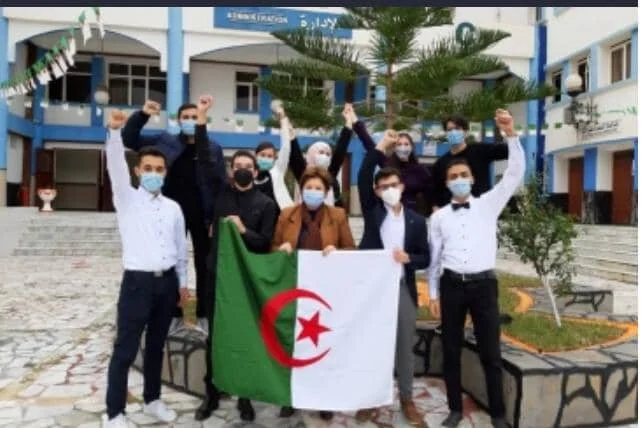Shedding Light On The Hopes And Challenges Of Algerian Youth
Injaz(Arabic for achievement) is patterned after a US-based youth organization, Junior Achievement, which operates in many African countries, including Ghana, Nigeria, Tanzania, as well as in other regions of the world.
The organization’s goal is to prepare young Africans for the 21st-century workforce, which requires skilled employees in the private and public sectors.
In starting the outfit, Ms. Jaber, the Jordanian-born executive who now lives in Algeria, wanted to offer young people in Africa the opportunity to develop their business leadership skills, including business planning, critical thinking, and effective communication.
Amid the COVID-19 pandemic, it is important for young people in Algeria to think about the job environment of the future and prepare themselves accordingly, says Ms. Jaber, the Executive Director of Injaz El Jazair, in an interview with Africa Renewal.
Youth unemployment
There are about 10.7 million Algerians between ages 19 and 25, or 30 percent of the population. According to UNESCO, despite the high enrollment rates in tertiary institutions—51.4 percent Gross Enrollment Ratio (GER) in 2018—coupled with the fact that a growing number of women are attending university (64.4 percent GER in 2018), unemployment remains a major challenge in the country.
The unemployment rate in 2019 was 11.4 percent. Sadly, while unemployment for men improved from 9.5 percent in 2018 to 9.1 percent in 2019, the rate for women declined from 19.5 percent to 20.4 percent during the same period.
High youth unemployment underpins the seriousness with which Ms. Jaber is implementing her training programmes. She points out that many young people in Algeria are not guided through their careers and that they lack access to professional communities that can prepare them for work.
The young people themselves are eager to develop new skill sets that will enable them to meet the demands of the labor market and they are looking for international opportunities to gain work experience, she says. The prospects of securing a job after university education were already dim even before COVID--19. The pandemic has only worsened the economic outlook and the financial risk for young people.
Nevertheless, with universities shut down, students have had time to participate in different skills-building programs offered by organizations like Injaz El Jazair.
“Being part of a global learning network, thinking ahead and having an adaptive mindset are keys for students and mentors who use technology platforms such as Teams to successfully attend online entrepreneurship classes during lockdown.”
She further explains that the pandemic has helped accelerate the integration of new technologies for distance learning, expanding youth participation in training programmes.
Innovative solutions
Injaz El Jazair has also awarded prizes to innovative young Africans. For example, ITdrops, a group of students at the Institute of Electrical and Electronic engineering (IGEE), Boumerdes, Algeria, partnering with Africa Startup Lab, won the first prize in a competition focusing on creating a solution to fight COVID-19. They competed against other young people in 13 Arab countries, including Bahrain, Egypt, Kuwait, Lebanon, and Morocco.
Guided by their coach, Dr. Dalila Cherifi, the students created a smart multifunction disinfection device during the lockdown.
Ms. Jaber is also proud of Sawtech (Sawt means Voice in Arabic), a venture established by students from Bejaïa, a Mediterranean city located in the North of Algeria, who have participated in entrepreneurship training offered by her organization. The students are in the process of developing Artificial Intelligence that will support people suffering from hearing and speech disorders.
An elated Ms. Jaber says: “We found it surprising that a small push from our non-profit organization has enabled them [ITdrops and Sawtech students] to reach new heights."
Young people are fast learners and ambitious, she maintains, and the sharp increase in their use of social media presented an opportunity which she readily seized.
“Success is a long road that is riddled with hurdles. And only those who overcome those hurdles will achieve true success.”
In addition, Algerians in urban cities are taking advantage of new e-commerce platforms and delivery services, heightening optimism for entrepreneurship and investment opportunities outside of the traditional mining, oil, and minerals sectors that create limited jobs for young people.
Bright future
Ms. Jaber is optimistic about the future; she believes that new technical, business leadership, and interpersonal skills will empower Algerian youth economically. Her advice to young people is for them “to have courage, perseverance, and to always aspire for greatness.
She concludes: “The youth in Algeria are outstanding. They now need to think about the sustainability of their projects, to persevere and to embrace all the opportunities that they get.”
The Youth Café works with young men and women in Kenya and around Africa to foster community resilience, propose innovative solutions, drive social progress, youth empowerment, and inspire political change. Young people are a tremendous and essential asset worth investing in. We hope to open the door to an unparalleled multiplier effect as our message spreads. The organization has developed several youth guidelines and policies including The Youth Manifesto and in an effort to amplify the voices and influence of the youth in important conversations in Kenya, Africa, and the World.
Get in touch with The Youth Café to partner in youth empowerment and elevation activities.



